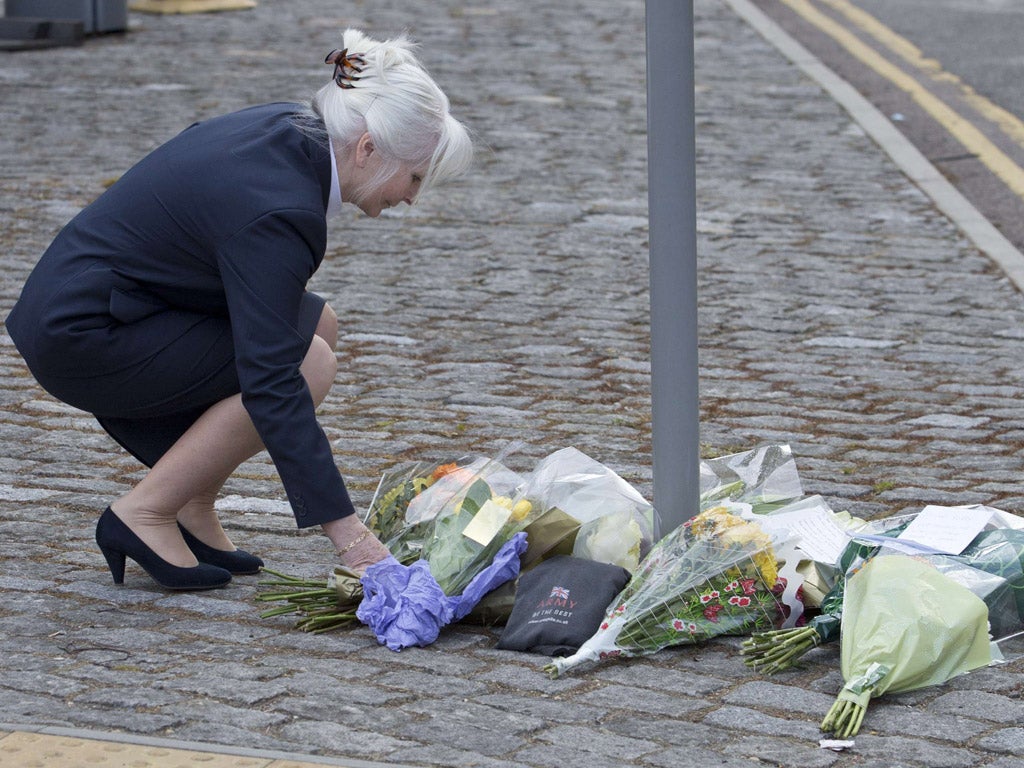Woolwich murder: They killed, then they performed - these men should be starved of our attention
This was a horrific act of violence but it's important we don't over-react, says the eminent sociologist and author of Invitation to Terror Frank Furedi

The reporter on ITV news describes it as the “day that Bagdad style violence came to South London”. And the Prince of political clowns George Galloway may have compared this incident to the violence people suffer in Syria. But of course there is more than hint of exaggeration in these remarks. Woolwich is obviously not Bagdad nor Damascus. And despite these fortunately very rare incidents of violence London remains a relatively relaxed and peaceful place. So what are we to make of the horrific murder that occurred on the streets of Woolwich?
The random fanatic
Since September 2001 there has been a dramatic shift in the way that the threat of terrorism has been understood and represented in Western societies. Traditionally terrorism was conceptualised as something that had its roots ‘over there’ – usually in the Middle East. When after the destruction of the World Trade Center former US President George W Bush raised the question ‘Why do they hate us?’, it was widely assumed that ‘they’ were from somewhere far away. The people who ‘hated us’, and who threatened us, were very much seen as being external to Western societies.
However, since 9/11 it has become increasingly difficult to ignore the fact that the threat may not simply be an external one, but a domestic one, too. The realisation that there are people who do not like their societies, who do not want to be British has made the terror threat feel more intimate. Consequently many experts have shifted their focus on ‘home-grown terrorists’ and the radicalisation of young people who feel existentially distant from their societies. Sometimes described as ‘lone wolf terrorists’, these individuals are represented as a radical threat to society. According to one report random terrorist attacks are MI5’s greatest fear.
One problem with the construction of the random fanatic, is that virtually any form of incomphrehensible act of violence – a school shooting, a crazed knife attack – can be redefined as an act of political terrorism. That is why far too many people cannot resist the temptation of defining the tragedy in Woolwich as an act of political terrorism. Writing in this vein, The Daily Telegraph’s Defence Editor, Con Coughlin claims that "the Woolwich 'beheading' is straight out of al-Qaeda’s terror manual".
Reality Terrorism
It is unlikely that the two men who perpetrated this despicable act of violence have been busy reading al-Qaeda’s terror manual. However there is little doubt that they are thoroughly immersed in the cultural values of reality entertainment. The script that they have internalised is one that is regularly rehearsed in front of the cameras of the reality television shows that dominate our screens.
The depraved violence perpetrated on the body of the murdered soldier is bad enough. But what is deeply disturbing is the obsessive manner with which these two murderers insisted that their performance ought to be recorded on camera. The whole episode was about the performance of the act. The murderers may have adopted the role of idealist jihadists as one of them chanted "We swear by almighty Allah we will never stop fighting you", but what they really meant was that we will never stop performing. As far as they were concerned there was always time for one more picture. Their lack of interest in escaping from the scene of the crime serves as testimony to their self-absorption to the drama.
Back in the eighties, when Margaret Thatcher declared that "publicity is the oxygen of terrorism", reality television and celebrity culture had not yet acquired such dominant influence over popular culture and everyday life. Today, publicity regarding an act of violence is far more likely to serve the narcissistic message that it is all about me than serve an act of political idealism. In reality culture, publicity becomes a medium through which otherwise unremarkable people become for a fleeting moment quite remarkable. Often the promise of fame leads to acts of self-abasement and self destruction. In Woolwich it led to the destruction of another human being.
The tragedy is that when the reality fanatic is given recognition as threat to national security we inadvertently encourage the destructive and obsessive quest for fame and recognition that haunts our society
A cultural rather than physical threat
The impact of an act of terror is ultimately determined by the way society reacts to it. That is why it is important not to over-react. The inflation of the threat can empower would-be reality fanatics, who may conclude that relatively modest acts of terrorism are likely to achieve a disproportionate impact. From time to time – fortunately very rarely – the random terrorist succeeds in causing great physical damage. But it is not the scale of this damage that endows them with such significance. They are not simply a physical but also a cultural threat.
Two memories of Woolwich haunt me. One is the sadistic act of murder. The other is the casual manner with which passers-by assumed the role of participants in the drama. Thankfully some sought to help and give assistance to the victim. But others took out their cameras to record the spectacle and adopted the role of "I am here too" . On twitter far too many people embraced the role of the voyeur and unwittingly gave recognition to two self-obsessed killers who did not deserve it.
Frank Furedi is author of Invitation to Terror: The Expanding Empire of the Unknown by Frank Furedi is published by Continuum.
Join our commenting forum
Join thought-provoking conversations, follow other Independent readers and see their replies
Comments
Bookmark popover
Removed from bookmarks